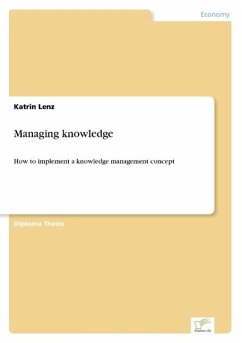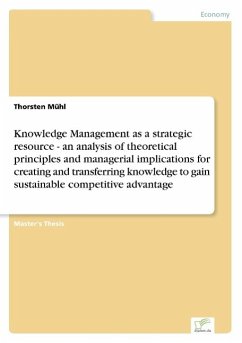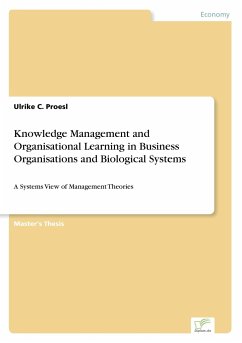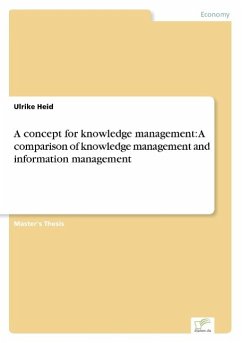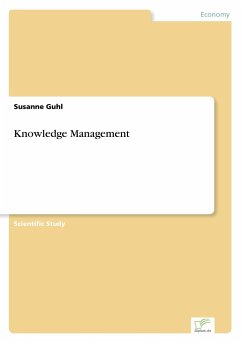Diploma Thesis from the year 2001 in the subject Business economics - Business Management, Corporate Governance, grade: 1,0, Erasmus University Rotterdam (International Management), language: English, abstract: Inhaltsangabe:Abstract: In an economy where the only certainty is uncertainty, the sure source of lasting competitive advantage is knowledge. Peter Drucker (1953)
Companies like Microsoft, Netscape, Coca-Cola and Yahoo can be found under the top U.S. companies with the highest market values in 1999. The market value represents the measure of value that the investors and markets associate with the company. However, these companies are not valued for their tangible assets (buildings, inventory, etc.), they are valued for something which cannot be shown on a balance sheet: their intangibles. These include brand recognition, Patents, customer loyalty, innovative business ideas, past achievements, etc. These companies are valued for the knowledge they possess. However, knowledge is of little value, if it cannot be found when needed. Therefore, a successful knowledge management concept is of crucial importance for these companies.
The knowledge management market is growing rapidly and it will continue to advance over the next years. Knowledge management is still a relatively young field with new concepts emerging constantly. Most knowledge management initiatives have focused entirely on changes in tools and technologies, such as intranets and Lotus Notes. But knowledge management is more complex: it covers everything the company does to make knowledge available to everyone.
The twenty-first century gives companies the tools and connectivity to easily obtain, share, and act on information quickly. Knowledge management uses these possibilities and recent studies showed that companies gained a competitive advantage by implementing it. According to Accenture research, a well implemented knowledge management process can improve employee productivity by an average of 60%.
Often, knowledge management is seen as storing documents in a database, thus hoping to enhance knowledge sharing through the implementation of technology. But to successfully apply knowledge management, companies need to implement a process of motivating and inciting people to share information. The old saying Knowledge is power is still popular. The people who are hoarding their knowledge believe that it makes them irreplaceable. However, real power does not come from knowledge kept, but from knowledge shared. People are expected to cooperate, to be open, to participate within the new economy, but resistance can be expected.
Obviously, knowledge management is a combination of various factors, namely: a vision, cultural change, motivating factors (rewards, incentives), an easy-to-use system, a committed workforce, etc. Knowledge management is therefore a result of a balance between the human-resource and the technology-based approach. Information technology is important in knowledge management, but it plays a rather supporting role.
There is no knowledge management concept that fits every organization, but there are several important features, one finds in every successful knowledge management initiative. The aim of this research is to identify these and to derive a basic knowledge management concept to be implemented in a management consultancy (Knaupp Scharpff Associates GmbH).
After an explanation of the basics of knowledge management and an analysis of the key areas, the phases of implementing a knowledge management concept are being described. Having described the theoretic background, different knowledge management concepts are being illustrated. The information about these concepts has been gained through self-conducted interviews with leading management consultancies (Accenture, OC & C Strategy Consultants and Arideon AG). These concepts are then analyzed and summarized in importa...
Hinweis: Dieser Artikel kann nur an eine deutsche Lieferadresse ausgeliefert werden.
Companies like Microsoft, Netscape, Coca-Cola and Yahoo can be found under the top U.S. companies with the highest market values in 1999. The market value represents the measure of value that the investors and markets associate with the company. However, these companies are not valued for their tangible assets (buildings, inventory, etc.), they are valued for something which cannot be shown on a balance sheet: their intangibles. These include brand recognition, Patents, customer loyalty, innovative business ideas, past achievements, etc. These companies are valued for the knowledge they possess. However, knowledge is of little value, if it cannot be found when needed. Therefore, a successful knowledge management concept is of crucial importance for these companies.
The knowledge management market is growing rapidly and it will continue to advance over the next years. Knowledge management is still a relatively young field with new concepts emerging constantly. Most knowledge management initiatives have focused entirely on changes in tools and technologies, such as intranets and Lotus Notes. But knowledge management is more complex: it covers everything the company does to make knowledge available to everyone.
The twenty-first century gives companies the tools and connectivity to easily obtain, share, and act on information quickly. Knowledge management uses these possibilities and recent studies showed that companies gained a competitive advantage by implementing it. According to Accenture research, a well implemented knowledge management process can improve employee productivity by an average of 60%.
Often, knowledge management is seen as storing documents in a database, thus hoping to enhance knowledge sharing through the implementation of technology. But to successfully apply knowledge management, companies need to implement a process of motivating and inciting people to share information. The old saying Knowledge is power is still popular. The people who are hoarding their knowledge believe that it makes them irreplaceable. However, real power does not come from knowledge kept, but from knowledge shared. People are expected to cooperate, to be open, to participate within the new economy, but resistance can be expected.
Obviously, knowledge management is a combination of various factors, namely: a vision, cultural change, motivating factors (rewards, incentives), an easy-to-use system, a committed workforce, etc. Knowledge management is therefore a result of a balance between the human-resource and the technology-based approach. Information technology is important in knowledge management, but it plays a rather supporting role.
There is no knowledge management concept that fits every organization, but there are several important features, one finds in every successful knowledge management initiative. The aim of this research is to identify these and to derive a basic knowledge management concept to be implemented in a management consultancy (Knaupp Scharpff Associates GmbH).
After an explanation of the basics of knowledge management and an analysis of the key areas, the phases of implementing a knowledge management concept are being described. Having described the theoretic background, different knowledge management concepts are being illustrated. The information about these concepts has been gained through self-conducted interviews with leading management consultancies (Accenture, OC & C Strategy Consultants and Arideon AG). These concepts are then analyzed and summarized in importa...
Hinweis: Dieser Artikel kann nur an eine deutsche Lieferadresse ausgeliefert werden.

